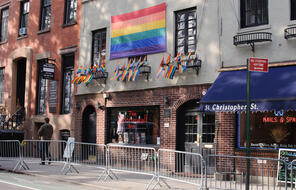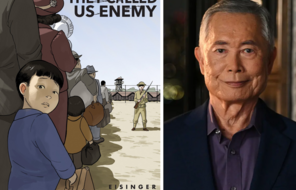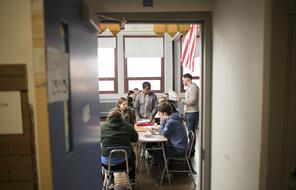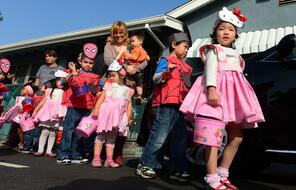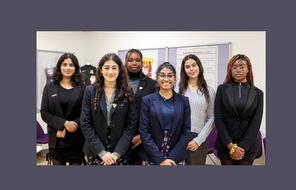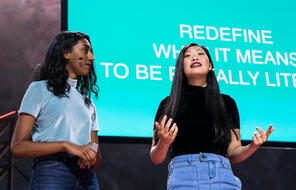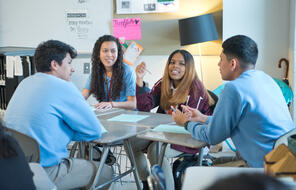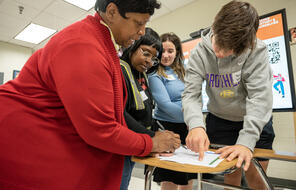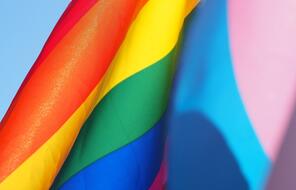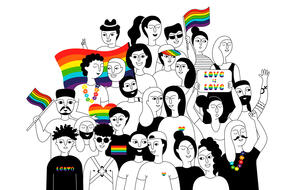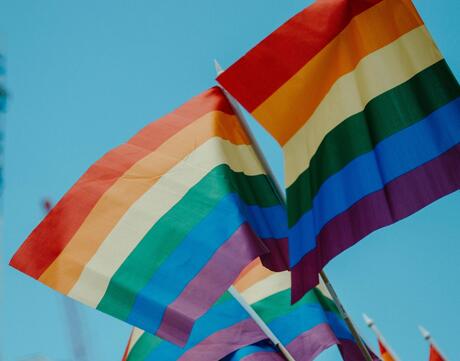
Conversations #BehindtheLens for LGBTQ+ History Month
LGBTQ+ History Month was founded by Schools OUT in 2004. Since then schools across the country have marked the month by celebrating and amplifying the histories and experiences of the LGBTQ+ community. This year’s theme, Behind the Lens, celebrates the work of LGBTQ+ people working in film and cinema. To mark the month, we talked to three LGBTQ+ creatives working behind the lens about the ways that telling queer stories can cultivate acceptance and tolerance in young people.
Alix Eve (they/them) is a writer/director who won Best British Director at the British Short Film awards for their film Minutes. They are currently working on a new short entitled Messenger. Eirene Wallace (she/her) works in post-production as a Second Assistant Editor and has worked on a variety of TV shows and films, including Outlander, Slow Horses and Batgirl. Elektra Adonis (they/them) works in a variety of sectors within the film industry, predominantly make-up and hair, but also special effects, prosthetics, costume, styling and props. They recently worked on the Netflix documentary Inside the UK’s Rapidly Changing Drag Culture and did make-up for the stage show Transphoria at the ICA.
Elektra Adonis
How did you get into the industry?
I consider myself very lucky because I met someone who had been in the industry for a long time who now mentors me. They saw my potential and offered me opportunities, which I did well in, which got me more opportunities and helped me to start growing my network. I would say networking has been a crucial element for the development of my career.
I also have done a lot of networking on nights out at queer events. I was essentially a walking billboard, with my own make-up and outfits I made and styled myself. People would pass on their details and I got jobs that way.
How does your LGBTQ+ identity influence your work?
I learned how to do make-up watching Ru Paul’s Drag Race, so I would say a lot. I had no interest in make-up until I started watching drag shows, and until I started hanging out with queer people. That’s where the interest I have for costume came from as well. The quick challenges on the show led me to start recycling my old worn out clothes. So at the very core of my practice is the LGBTQ+ community, that’s who I learnt from, that continues to be who I learn from because 90% of the time it is queer people that I work with.
Why is it important that LGBTQ+ stories are told?
Because I had no idea the LGBTQ+ community existed until I was in my late teens. Where I grew up there was no representation in the media. I didn’t see any LGBTQ+ people on social media or on TV, hear about them in school or anything really. I grew up not knowing who I was, I didn’t have any point of reference to who I might be or who I might want to be. That was really difficult. People need representation, whatever category they’re in they need representation. I don’t think you can succeed unless you see people like yourself be successful.
What parts of LGBTQ+ history are you inspired by?
I think the Stonewall riots embody for me this quote, ‘be the change you want to see.’ The riots represent to me the idea that if you're not happy with your conditions you can always protest to influence change. If you’re unhappy chances are other people are unhappy about the same thing and it’s not just you. To be able to unify people in that way and obtain positive change is big. Self-advocating is big, and if you don’t do it no-one else will do it for you.
What can teachers do to create empathy for LGBTQ+ experiences and students?
Something I’m seeing now in college is that teachers are mindful that students have pronouns different to what they were assigned at birth, which I think is really cool. I find it very affirming when my correct pronouns are used, so making space for that.
Most of the time when there is a queer kid in class everyone knows; often the class knows before they know. It’s watching out for those things. Queer kids get bullied a lot, I got bullied. Teachers have the authority to step in and say ‘this is not cool’ and to educate on why it’s not cool.
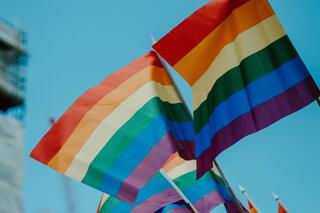
LGBTQ+ History and Why It Matters
LGBTQ+ History Month is an opportunity to amplify queer histories and experiences in the classroom. Use our resource to explore over two millennia of LGBTQ+ history with your students.
Eirene Wallace
How did you get into the film industry?
It was hard to get my foot in the door, and took a long time. I studied film at university but I wouldn’t say that was a definite ‘in’, it helped me develop my skills and stuff but the industry is so different. What worked for me was getting a traineeship in Scotland (where I’m from), on a TV show called Outlander. Different production companies offer traineeships, where you learn ins-and-outs of a department, from there you can build a network and apply to future jobs.
It’s often getting that first traineeship that’s difficult, it takes a lot of trial and error, a lot of applying for different things and not getting them; it’s about staying resilient and not getting too bogged down by rejection because that’s part of it. But once you're in, it’s a lot easier to keep moving and get different jobs.
What advice would you give to young people wanting to break into the editing world?
Anything you can do while applying for traineeships to show you’re invested in a career in the industry is really helpful. When I was starting out I made lots of videos for different charities, made lots of social media videos and stuff, just so I had stuff to show people, and to show I had a genuine interest in the job. Short films, making films with your pals also really helps.
Advice I would give is just keep curious about what you’re doing, watch loads of stuff, know what you like and don’t like. When I was starting off and studying film, I never thought editing was a department I’d like to work in, or something I’d be good at. It seemed really intimidating, and really technical. But once I started doing it, I realised it’s so much more than that, it’s also about creative decisions; it’s storytelling from the other end.
Do you recall the first time you saw LGBTQ+ representation on screen?
I watched But I’m a Cheerleader with friends at a sleepover, and it totally changed my life. Everything about it I loved, especially the campness of it. I loved camp films like Breakfast on Pluto or Clueless when I was growing up and I didn’t even know I was queer. I am definitely influenced by this in the way I edit. When I edit stuff I definitely want to have a sense of humour, I like to have my own style, but at the same time I get inspiration from so many different places, so I definitely think the campy funness of films like these would definitely come across in the way I’m editing.
How can representing LGBTQ+ stories on screen help young people recognise/stand up to homophobia in school?
Film can show young people how to be better allies by showing how people can be different to you, and that difference isn’t always something to be scared of, or to make fun of.

LGBTQ+ History Month
What is LGBTQ+ History Month and why does it matter? This assembly asks young people to consider why representation matters and uses the Netflix show ‘Heartstopper’ as a case study. After watching a video on the making of ‘Heartstopper’ and the trailer, students are asked to consider the significance of the representation on screen and why it matters.
Alix Eve
How did you get into the industry?
I did a BA in filmmaking at Leeds University and later completed an MA in screenwriting which was helpful to progress my craft. I still meet with writers I met on the course to workshop ideas. At university I worked at the Film Equipment Issue and Retrieval Department, which allowed me to go into work as a Facilities Coordinator and financially supported me to advance my own directing and writing practice.
My short film Minutes came from an idea that I had several years ago and then I met my collaborator and things came together. The film was financed via crowdfunding and we were selected for a number of film festivals including BFI Flare, Leeds International, Outfest LA, This is England and the British Short Films Awards.
What advice would you give to young people wanting to break into industry?
Advice I would give to young people is question what stories you want to tell and why. Make sure you're passionate about your stories, why you’re telling them, don’t try and do what other people want you to do, try and listen to your gut, and tell the stories you think are important to tell.
Can you describe the ways LGBTQ+ representation was meaningful to you as a teenager?
I didn’t learn anything about LGBTQ+ history or experiences in school. I couldn’t come out, I didn’t even know the meaning of coming out. Coming from this context, I really vividly remember watching Chasing Amy when I must have been 11 or 12. It was a very confusing film at that age, with elements of biphobia in it, but it did kickstart my seeking of queer representation. Once I found these things, it really got me through emotionally. I am a strong believer that if you don’t see it; you won’t feel that you're valid. Whether that’s like two people walking down the street holding hands or seeing a lesbian couple on a soap opera.
How do LGBTQ+ themes or issues influence your work?
Me and my collaborator always say our work is inherently queer. It’s so intrinsic to my work, that when I do sit down I will be doing something LGBTQ+ and not realise I’m doing it. It’s the fundamental thing about my work. For instance, I’m excited about my latest film where the main character is overtly queer, but the story isn’t about romantic connection. I think there has been a lot of progress in recent years. I’m really excited for the film Blue Jean (15+), a new film about a queer teacher's experience of Section 28.



